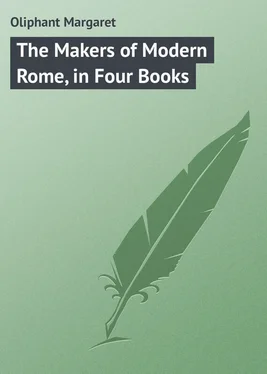Margaret Oliphant - The Makers of Modern Rome, in Four Books
Здесь есть возможность читать онлайн «Margaret Oliphant - The Makers of Modern Rome, in Four Books» — ознакомительный отрывок электронной книги совершенно бесплатно, а после прочтения отрывка купить полную версию. В некоторых случаях можно слушать аудио, скачать через торрент в формате fb2 и присутствует краткое содержание. Жанр: foreign_prose, на английском языке. Описание произведения, (предисловие) а так же отзывы посетителей доступны на портале библиотеки ЛибКат.
- Название:The Makers of Modern Rome, in Four Books
- Автор:
- Жанр:
- Год:неизвестен
- ISBN:нет данных
- Рейтинг книги:5 / 5. Голосов: 1
-
Избранное:Добавить в избранное
- Отзывы:
-
Ваша оценка:
- 100
- 1
- 2
- 3
- 4
- 5
The Makers of Modern Rome, in Four Books: краткое содержание, описание и аннотация
Предлагаем к чтению аннотацию, описание, краткое содержание или предисловие (зависит от того, что написал сам автор книги «The Makers of Modern Rome, in Four Books»). Если вы не нашли необходимую информацию о книге — напишите в комментариях, мы постараемся отыскать её.
The Makers of Modern Rome, in Four Books — читать онлайн ознакомительный отрывок
Ниже представлен текст книги, разбитый по страницам. Система сохранения места последней прочитанной страницы, позволяет с удобством читать онлайн бесплатно книгу «The Makers of Modern Rome, in Four Books», без необходимости каждый раз заново искать на чём Вы остановились. Поставьте закладку, и сможете в любой момент перейти на страницу, на которой закончили чтение.
Интервал:
Закладка:
The young Paulina, dear on all accounts to the ladies of the Aventine as her mother's daughter, and as her husband's wife (for Pammachius, the friend and schoolfellow of Jerome, was one of the fast friends and counsellors of the community), as well as for her own virtues, died in the flower of life and happiness, a rich and noble young matron exhibiting in her own home and amid the common duties of existence, all the noblest principles of the Christian faith. She had not chosen what these consecrated women considered as the better way: but in her own method, and amid a world lying in wickedness, had unfolded that white flower of a blameless life which even monks and nuns were thankful to acknowledge as capable of existing here and there in the midst of worldly splendours and occupations. She left no children behind her, so that her husband Pammachius was free of the anxieties and troubles, as well as of the joy and pride, of a family to regulate and provide for. His young wife left to him all her property on condition that it should be distributed among the poor, and when he had fulfilled this bequest the sorrowful husband himself retired from life, and entered a convent, in obedience to the strong impulse which swayed so many. Before this occurred however "all Rome" was roused by another great spectacle. The entire city was invited to the funeral of Paulina as if it had been to her marriage, though those who came were not the same wondering circles who crowded round the Lateran gate to see Fabiola in her humiliation. It was the poor of Rome who were called by sound of trumpet in every street, to assemble around the great Church of St. Peter, where were those tombs of the Apostles which every Christian visited as the most sacred of shrines, and where Paulina was laid forth upon her bier, the mistress of the feast. The custom was an old one, and chambers for these funeral repasts were attached to the great catacombs and all places of burial. The funeral feast of Paulina however meant more than ordinary celebrations of the kind, as the place in which it was held was more impressive and imposing than an ordinary sepulchre however splendid. She must have been carried through the streets in solemn procession, from the heights on which stood the palaces of her ancient race, across the bridge, and by the tomb of Hadrian to that great basilica where the Apostles lay, her husband and his friends following the bier: and in all likelihood Marcella and her train were also there, replacing the distant mother. St. Peter's it is unnecessary to say was not the St. Peter's we know; but it was even then a great basilica, with wide extending porticoes and squares, and lofty roof, though the building was scarcely quite detached from the rock out of which the back part of the cathedral had been hewn.
Many strange sights have been seen in that spot which once was the centre of the civilised world, and this which seems to us one of the strangest was in no way unusual or against the traditions of the age in which it occurred. The church itself, and all its surroundings, nave and aisles and porticoes, and the square beyond, were filled with tables, and to these from all the four quarters of Rome, from the circus and the benches of the Colosseum, where the wretched slept and lurked, from the sunny pavements, and all the dens and haunts of the poor by the side of the Tiber, the crowds poured, in those unconceivable yet picturesque rags which clothe the wretchedness of the South. They were ushered solemnly to their seats, the awe of the place, let us hope, quieting the voices of a profane and degraded populace, and overpowering the whispering, rustling, many-coloured multitude. Outside the later comers would be more unrestrained, and the roar, even though subdued, of thronging humanity must have come in strangely to the silence of the great church, and of the mourners, bent upon doing Paulina honour in this curious way. Did she lie there uplifted on her high bier to receive her guests? Or was the heart-broken Pammachius the host, standing pale upon the steps, over the grave of the Apostles? When they were "saturated" with food and wine, the first assembly left their places and were succeeded by another, each as he went away receiving from the hands of Pammachius himself a sum of money and a new garment. "Happy giver, unwearied distributor!" says the record. The livelong day this process went on; a winter day in Rome, not always warm, not always genial, very cold outside in the square under the evening breeze, and no doubt growing more and more noisy as one band continued to succeed another, and the first fed lingered about comparing their gifts, and hoping perhaps for some remnants to be collected at the end from the abundant and oft-renewed meal. There were no doubts in anybody's mind, as we have said, about encouraging pauperism or demoralising the recipients of these gifts; perhaps it would have been difficult to demoralise further that mendicant crowd. But one cannot help wondering how the peace was kept, whether there were soldiers or some manner of classical police about to keep order, or if the disgusted Senators would have to bestir themselves to prevent this wild Christian carnival of sorrow and charity from becoming a danger to the public peace.
We are told that it was the sale of Paulina's jewels, and her splendid toilettes which provided the cost of this extraordinary funeral feast. "The beautiful dresses woven with threads of gold were turned into warm robes of wool to cover the naked; the gems that adorned her neck and her hair filled the hungry with good things." Poor Paulina! She had worn her finery very modestly according to all reports; it had served no purposes of coquetry. The reader feels that something more congenial than that coarse and noisy crowd filling the church with its deformities and loathsomeness might have celebrated her burial. But not so was the feeling of the time; that they were more miserable than words could say, vile, noisome, and unclean, formed their claim of right to all these gifts – a claim from which their noisy and rude profanity, their hoarse blasphemy and ingratitude took nothing away. Charity was more robust in the early centuries than in our fastidious days. "If such had been all the feasts spread for thee by thy Senators," cried Bishop Paulinus, the historian of this episode, "oh Rome thou might'st have escaped the evils denounced against thee in the Apocalypse." We must remember that whatever might have been the opinion later, there was no doubt in any Christian mind in the fourth century that Rome was the Scarlet Woman of the Revelation of St. John, and that a dreadful fate was to overwhelm her luxury and pride.
Pammachius, when he had fulfilled the wishes of his wife in this way, thrilling the hearts of the mourning mother and sister in Bethlehem with sad gratification, and edifying the anxious spectators on the Aventine, carried out her will to its final end by becoming a monk, but with the curious mixture of devotion and independence common at the time, retired to no cloister, but lived in his own house, fulfilling his duties, and appearing even in the Senate in the gown and cowl so unlike the splendid garb of the day. He was no doubt one of the members for the poor in that august but scarcely active assembly, and occupied henceforward all his leisure in works of charity and religious organisations, in building religious houses, and protecting Christians in every necessity of life.
We have said that Rome in these days was as freely identified with the Scarlet Woman of the Apocalypse as ever was done by any Reformer or Puritan in later times. To Jerome she was as much Babylon, and as damnable and guilty in every way as if he had been an Orangeman or Covenanter. Mildness was not general either in speech or thought: it has seldom been so perhaps in religious controversy. It is curious indeed to mark how, so near the fount of Christianity, the Church had already come to rend itself with questions of doctrine, and expend on discussions of philosophical subtlety the force that was wanted for the moral advantage of the world. But that no doubt was one of the defects of the great principle of self-devotion which aimed at emptying the mind of everything worldly and practical, and fixing it entirely upon spiritual subjects, thus substituting them for the ruder obstacles which occupied in common life the ruder forces of nature.
Читать дальшеИнтервал:
Закладка:
Похожие книги на «The Makers of Modern Rome, in Four Books»
Представляем Вашему вниманию похожие книги на «The Makers of Modern Rome, in Four Books» списком для выбора. Мы отобрали схожую по названию и смыслу литературу в надежде предоставить читателям больше вариантов отыскать новые, интересные, ещё непрочитанные произведения.
Обсуждение, отзывы о книге «The Makers of Modern Rome, in Four Books» и просто собственные мнения читателей. Оставьте ваши комментарии, напишите, что Вы думаете о произведении, его смысле или главных героях. Укажите что конкретно понравилось, а что нет, и почему Вы так считаете.












